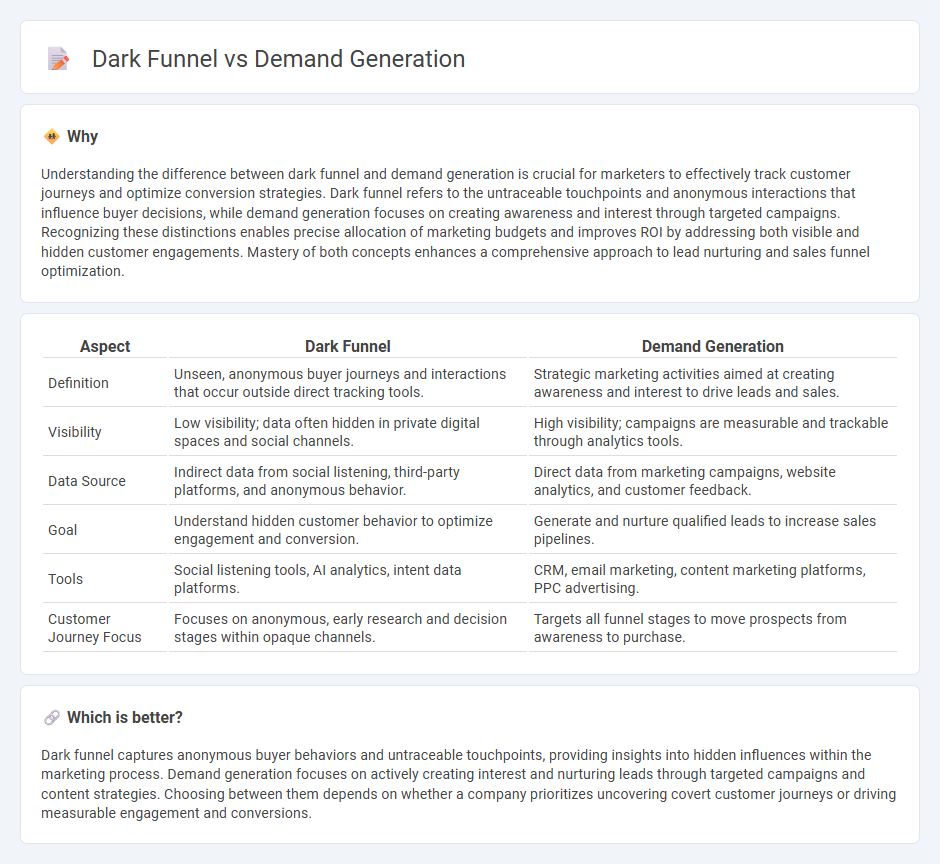
Dark funnel marketing refers to the unseen stages of the customer journey where prospects engage with content anonymously before entering the sales funnel, making it challenging to track and measure influence. Demand generation focuses on driving awareness and interest through targeted campaigns and content strategies that produce measurable leads and sales opportunities. Explore how mastering both dark funnel insights and demand generation techniques can revolutionize your marketing strategy.
Why it is important
Understanding the difference between dark funnel and demand generation is crucial for marketers to effectively track customer journeys and optimize conversion strategies. Dark funnel refers to the untraceable touchpoints and anonymous interactions that influence buyer decisions, while demand generation focuses on creating awareness and interest through targeted campaigns. Recognizing these distinctions enables precise allocation of marketing budgets and improves ROI by addressing both visible and hidden customer engagements. Mastery of both concepts enhances a comprehensive approach to lead nurturing and sales funnel optimization.
Comparison Table
| Aspect | Dark Funnel | Demand Generation |
|---|---|---|
| Definition | Unseen, anonymous buyer journeys and interactions that occur outside direct tracking tools. | Strategic marketing activities aimed at creating awareness and interest to drive leads and sales. |
| Visibility | Low visibility; data often hidden in private digital spaces and social channels. | High visibility; campaigns are measurable and trackable through analytics tools. |
| Data Source | Indirect data from social listening, third-party platforms, and anonymous behavior. | Direct data from marketing campaigns, website analytics, and customer feedback. |
| Goal | Understand hidden customer behavior to optimize engagement and conversion. | Generate and nurture qualified leads to increase sales pipelines. |
| Tools | Social listening tools, AI analytics, intent data platforms. | CRM, email marketing, content marketing platforms, PPC advertising. |
| Customer Journey Focus | Focuses on anonymous, early research and decision stages within opaque channels. | Targets all funnel stages to move prospects from awareness to purchase. |
Which is better?
Dark funnel captures anonymous buyer behaviors and untraceable touchpoints, providing insights into hidden influences within the marketing process. Demand generation focuses on actively creating interest and nurturing leads through targeted campaigns and content strategies. Choosing between them depends on whether a company prioritizes uncovering covert customer journeys or driving measurable engagement and conversions.
Connection
The dark funnel refers to the hidden, untracked stages of the customer journey where potential buyers engage with content without direct attribution, significantly impacting demand generation efforts. Demand generation relies on identifying and nurturing these elusive touchpoints through advanced analytics and multichannel strategies to convert anonymous prospects into leads. Understanding the dark funnel enhances demand generation by improving targeting accuracy and optimizing resource allocation for higher ROI.
Key Terms
Lead Acquisition
Demand generation drives lead acquisition by creating awareness through targeted campaigns, content marketing, and personalized outreach that attract potential customers at various stages of the buying journey. The dark funnel encompasses the unseen interactions and influences, such as anonymous website visits, peer recommendations, and third-party content engagement, which significantly impact lead behavior before formal tracking begins. Explore strategies to illuminate the dark funnel and enhance lead acquisition effectiveness through integrated demand generation efforts.
Buyer Intent
Demand generation targets potential customers through broad marketing strategies to increase brand awareness and drive leads, while the dark funnel captures buyer intent data from untracked interactions and anonymous content consumption. Understanding the dark funnel allows marketers to identify hidden buyer signals and tailor personalized engagement before traditional tracking methods detect interest. Explore how integrating demand generation with dark funnel insights can optimize your marketing impact and buyer intent recognition.
Attribution
Demand generation strategies aim to create awareness and interest throughout the buyer's journey, while the dark funnel represents untracked or anonymous interactions that evade traditional attribution models. Accurate attribution requires integrating multi-touchpoint data and leveraging advanced analytics to illuminate hidden buyer behaviors within the dark funnel. Explore advanced attribution techniques to optimize demand generation effectiveness and uncover hidden conversion pathways.
Source and External Links
What is Demand Generation? Definition, Strategies, Benefits - Demand generation is the full set of B2B marketing and sales initiatives designed to create interest in a company's product or service, focusing on expanding audience awareness and generating high-quality leads through addressing prospects' problems with solutions.
10 demand generation strategies to increase leads - Demand generation is a marketing strategy that creates awareness and buzz about a product or service to grow the customer base by educating and exciting the target audience and making the business solution the clear choice for their needs.
Demand generation - Wikipedia - Demand generation is a holistic marketing approach focused on building awareness, positioning relevance, and supporting buying decisions across the customer journey, linking marketing programs with sales processes to drive demand and sales.
 dowidth.com
dowidth.com